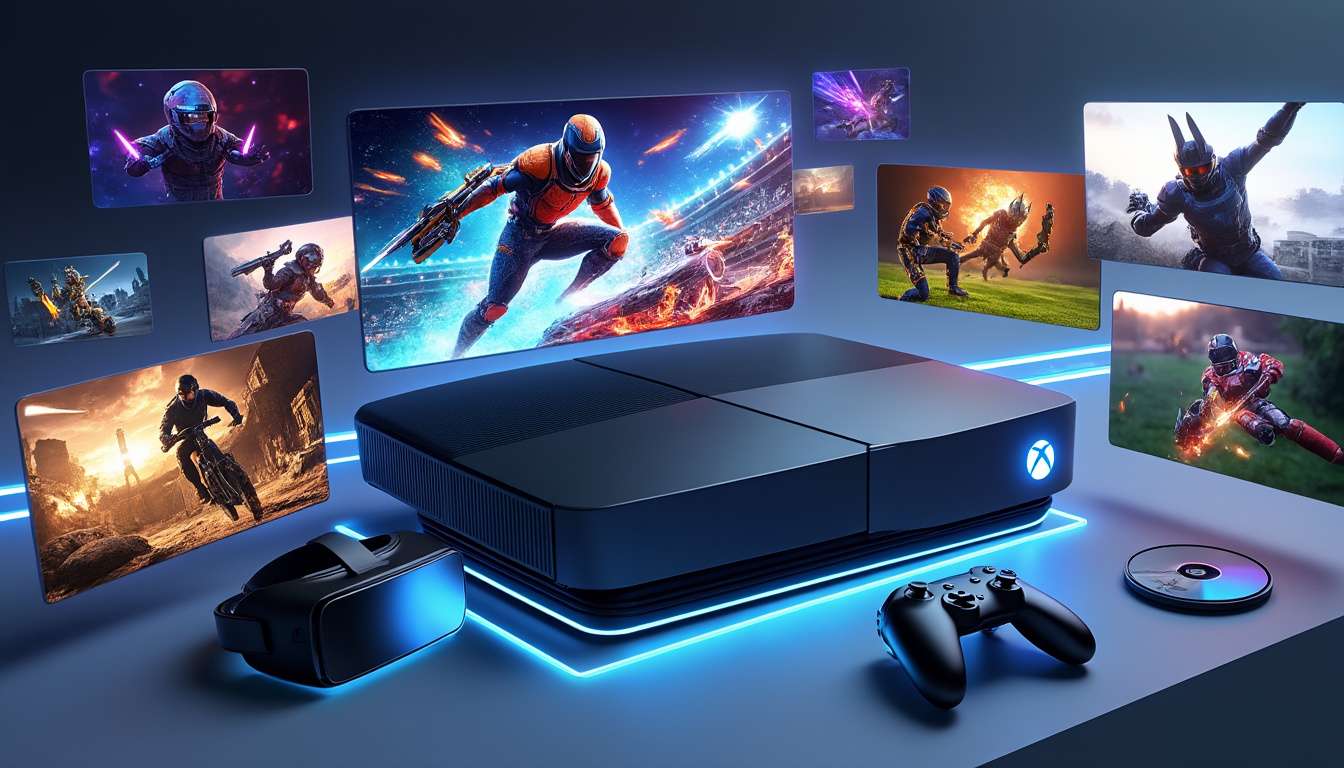Rumors about Xbox pivoting away from hardware have recirculated, but as of 2025, Microsoft has firmly reaffirmed its commitment to first‑party consoles while continuing to evolve its hardware ecosystem. The company has positioned Xbox as a blended strategy: keep a strong hardware lineup that supports flagship franchises like Halo and Forza, while expanding services through Game Pass and cloud gaming. This stance comes as part of a broader industry shift toward software-led approaches, but the official response makes clear that the core hardware roadmap remains intact and is being powered by sustained collaborations with AMD and other partners. For fans of PlayStation, Nintendo, and the broader market, the message is that Xbox intends to compete on multiple axes—content, hardware, and services—without sacrificing the prestige of owning a console. The long view suggests continued competition across ecosystems, with ongoing cross‑pollination of titles and features across Xbox, Sony, and Nintendo platforms.
Image credit: Microsoft
Xbox’s Future Console Plans Remain Intact — Latest Developments and Microsoft’s Official Response
Microsoft’s latest communications emphasize continuity on hardware while acknowledging the growing importance of services. The key takeaway is that the next generation of Xbox hardware is still in active development, with the AMD partnership continuing to power new silicon generations. The company also notes that cloud gaming remains a complementary path rather than a replacement for native hardware, reinforcing a balanced strategy that serves both traditional console players and cloud enthusiasts. This stance is critical as Game Pass continues to drive adoption and revenue, especially in markets where console ownership remains strong. For readers tracking the broader console wars—Xbox versus PlayStation from Sony, or Nintendo’s resilient ecosystem—this development confirms that hardware refreshes are still on the agenda, alongside ongoing investments in software and subscriptions. To stay informed on the evolving platform, see coverage on upcoming Xbox Series X|S titles, PC arm support, and the latest Game Pass updates.
- Hardware roadmap remains active with a full successor planned for the Xbox Series X|S cycle; Upcoming Xbox Series X 2025
- AMD continues as a strategic silicon partner, aligning first-party devices with bespoke hardware; AMD collaboration in Xbox PC gaming
- Cloud Gaming is expanding but not replacing local consoles, with ongoing investments in xCloud and Game Pass; Cloud Gaming Game Pass updates
- Pricing and subscription structure shifts are part of a broader strategy to sustain content funds; Game Pass price increase coverage
- Hardware‑focused franchises like Halo and Forza remain core pillars amid platform diversification; Forza and Halo cross‑franchise highlights
Image credit: Microsoft
Official Statements And The Hardware Path Forward
Microsoft has reiterated that it remains “actively investing in our future first-party consoles and devices designed, engineered and built by Xbox.” The official stance underscores a multi‑year hardware roadmap aligned with AMD’s silicon strategy, while also highlighting the continued importance of Game Pass and cloud services. This clarifies that the perceived shift toward cloud gaming is not a hardware death knell, but a broader approach to accessibility. For readers tracking the market, this means Xbox hardware will coexist with software‑led strategies, and both avenues will feed into a larger ecosystem that also includes third‑party support from Activision, Bethesda, and other developers. More context and official details can be found in industry coverage and related updates throughout 2025.
- Official confirmation of continued hardware investment; Xbox hardware remains a priority
- AMD partnership continues to power next‑gen devices
- Cloud strategy supplements, not replaces, native consoles
- Game Pass remains a central revenue driver and growth vehicle
- Cross‑franchise momentum across Halo, Forza, and Bethesda titles
Industry Context And Market Signals: Game Pass, Cloud, And Cross‑Platform Play
The industry in 2025 shows a shift toward services, but hardware remains an important differentiator. Microsoft’s approach sits at the intersection of software subscriptions, cloud infrastructure, and console hardware, creating a hybrid model that keeps Xbox competitive against PlayStation and Nintendo. For gamers, this translates into a robust Game Pass lineup with day‑one releases, ongoing PC and cloud streaming, and continued support for familiar Xbox ecosystems. The broader market is watching how this strategy affects pricing, content availability, and the speed at which studios under Activision and Bethesda leverage Xbox platforms. In practical terms, players can expect continued access to a growing library through Game Pass, regular hardware refreshes, and cross‑family titles that bridge Xbox and other ecosystems.
- Game Pass remains central to revenue and player engagement; see ongoing updates; Microsoft Xbox Game Pass coverage
- Cloud gaming expands to more locales and devices, while high‑end titles leverage native hardware advantages; Cloud Gaming Game Pass details
- Industry discourse contrasts with PlayStation and Nintendo strategies; reflect on Sony and Nintendo ecosystem dynamics; Bend Studio and PlayStation exclusives
- Hardware price cycles and supply chains influence consumer sentiment; Consoles price hikes analysis
- Upcoming first‑party efforts include content from Halo, Forza, and Activision‑Bethesda projects; Upcoming 2025 video games
What This Means For The Competition: PlayStation, Nintendo, And Third-Party Partners
The official stance on hardware does not exist in a vacuum. Sony’s PlayStation and Nintendo’s Switch successor strategies continue to shape consumer choice, while Activision and Bethesda titles increasingly appear across multiple ecosystems. For players who prioritize exclusives, ecosystem stability remains a key factor, with Halo and Forza serving as strong console anchors for Xbox. The ongoing collaboration with AMD and the scalability of Game Pass introduce a model where ownership and access coexist, rather than compete in a binary hardware vs. software debate. For deeper context on the broader market, readers can explore ongoing coverage and cross‑platform discussions linked in this article.
- Sony‑led exclusives and cross‑platform lending shape competitive timing; Bend Studio exclusives and PlayStation strategy
- Nintendo’s hybrid approach maintains a unique market segment; see Nintendo Direct titles discussions; Nintendo Direct titles and Xbox PC synergy
- Activision and Bethesda collaborations influence cross‑platform projects; Ninja Gaiden for Forza Horizon cross‑overs
- Market signals around subscriptions and content affordability; Game Pass affordability analysis
- Developer perspectives on multi‑platform releases and gear alignments; Xbox on PC rebrand and strategy
Image credit: Microsoft
What To Expect Next: Near‑Term Moves For Xbox In 2025–2026
With hardware plans reaffirmed, the focus now shifts to how quickly Microsoft can scale its next‑gen silicon, broaden Game Pass, and optimize cloud delivery. Expect incremental hardware refreshes that improve performance and energy efficiency, alongside a deeper integration of Activision and Bethesda catalogues into the Xbox ecosystem. Pricing strategies and bundle options will likely reflect ongoing debates about affordability versus investment in exclusive content. For fans of Halo, Forza, and other flagship franchises, the next 12–24 months should bring new releases that leverage both console and cloud ecosystems, while ensuring cross‑play and cross‑progression across devices remains seamless.
- Next‑gen hardware cadence aligned with AMD silicon cycles; refreshed consoles with improved efficiency
- Deeper Game Pass integrations, including more day‑one third‑party titles and live‑service updates
- Continued cross‑play and cross‑progress across Xbox, PC, and cloud devices
- Strategic pricing reviews to balance subscription growth with content investment
- Expanded presence of Xbox‑branded handheld concepts alongside cloud‑native approaches
Image credit: Microsoft
FAQ
Is Xbox planning to drop hardware in favor of cloud gaming? No. Microsoft has stated it is actively investing in first‑party consoles and devices, with the hardware roadmap remaining a priority alongside Game Pass and cloud services.
What role will Game Pass play as the hardware strategy continues? Game Pass remains a central revenue driver and a key way for players to access a broad library across console, PC, and cloud. Pricing and content updates are designed to sustain long‑term growth.
How does this affect competition with Sony and Nintendo? The stance reinforces a multi‑platform strategy where exclusive franchises, hardware refreshes, and cloud services coexist, shaping a broader competitive landscape between Xbox, PlayStation, and Nintendo.
Where can I read more about upcoming titles and hardware updates? See coverage on upcoming Xbox Series X titles, AMD collaborations, and Game Pass updates at sources like Upcoming Xbox Series X 2025, Microsoft Xbox PC Gaming, and Xbox Game Pass August 2025.

